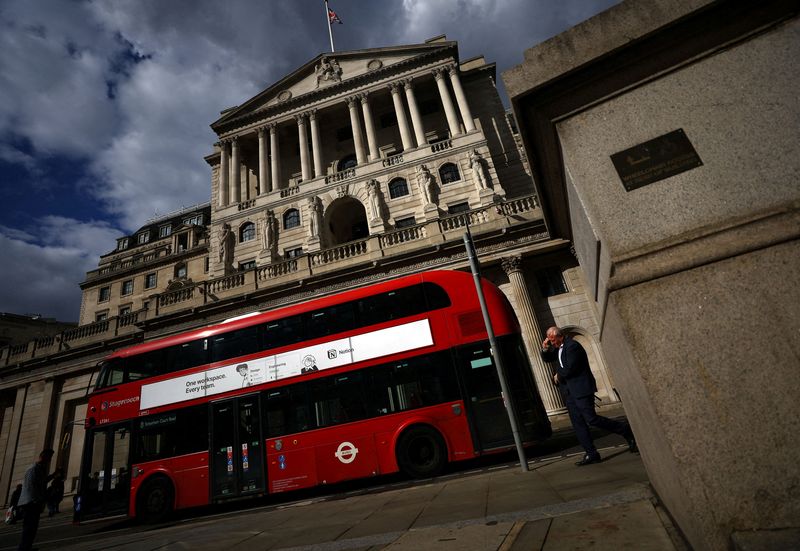
© Reuters. FILE PHOTO: A man walks past the Bank of England in London, Britain, September 28, 2022. REUTERS/Hannah McKay/File Photo
LONDON (Reuters) – Britain’s finance ministry and the Bank of England should take the interests of taxpayers more into account in decisions around the sale of government bonds from the central bank’s massive balance sheet, lawmakers said on Wednesday.
The BoE bought some 875 billion pounds ($1.10 trillion) of gilts over more than a decade after the 2008-09 financial crisis, using freshly created reserves to stimulate Britain’s economy, a process known as quantitative easing (QE).
It is now in the process of selling down its holdings of gilts through a combination of active sales and allowing bonds to mature – also known as quantitative tightening (QT) – and its stock now stands at 737 billion pounds.
“With more public money at stake than was ever envisaged when QE was launched, the Bank and Treasury should take our advice and explore whether the usual value for money considerations can be factored in when deciding the pace and level of QT they implement,” Harriett Baldwin, chair of the Treasury Committee in parliament’s lower house, said.
The committee said the accounting system around the central bank’s balance sheet should be revamped if the BoE were ever to reintroduce QE.
“The way in which profits and losses are accounted for should be revisited, in particular the 2012 decision to remit cashflows quarterly between the Bank and the Treasury,” the report said.
These cashflows have come under increasing scrutiny.
Rising bond prices and ultra-low interest rates through the 2010s made QE profitable for the BoE, which remitted these profits – worth 124 billion pounds at their peak – to the finance ministry.
Now the BoE’s stock of bonds have turned into a big loss-maker for the public finances, thanks to rising interest rates and the falling value of gilts over the last couple of years.
In turn the finance ministry is required to finance the BoE’s losses – thereby limiting the government’s fiscal space at a time of already stretched budgets.
The BoE now expects these losses will exceed the profits made during the 2010s, resulting in a net loss of around 50 billion pounds by the mid-2030s.
“We welcome the committee’s report and will consider its findings carefully before responding. We continue to encourage active debate about our monetary policy decisions and their implementation,” the BoE said in a statement.
($1 = 0.7950 pounds)
Source: Investing.com



























